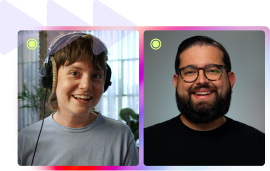Podcast: How Freakonomics (Podcast) records high-quality episodes all over the globe
Learn how the Freakonomics network produces superb shows with guests tuning in from anywhere.

.webp)
You may have heard about Freakonomics from their best-selling book, or perhaps you’ve heard Stephen J. Dubner speak eloquently on Freakonomics Radio, but either way, you’ve heard of Freakonomics, and likely in HD audio…
The knowledgeable people over at Freakonomics have recorded hundreds of shows in the studio about topics ranging from the economics of sleep to Chuck E. Cheese’s, and everything in between.
When the COVID-19 pandemic hit and the Freakonomics team was no longer able to get their team of producers, directors, hosts, as well as guests in the same packed recording studio, they needed a reliable studio-quality solution — and fast.

.svg)

Freakonomics’ solution to recording studio-quality podcasts from anywhere:
Riverside.fm — it’s super easy to record in studio-quality, 48 kHz audio with participants, hosts, and directors that can be located anywhere in the world.
Everything is recorded locally, meaning that internet quality does not impact the quality of the recording, so you can get up to 4K quality video and professional-sounding audio from anywhere, despite the wifi signal.
See Riverside for Business in action.
Freakonomics describing the guest experience on the platform
Freakonomics regularly interviews high-profile guests with cramped schedules. Therefore, they want to make sure the process and experience for guests are seamless. In the words of Greg Rippin, Technical Director at Freakonomics Radio:
“We want our guests to be focused on what they're there to talk about, not on the technical stuff, so we wanted to get as much of that out of their hands as possible.
.svg)

We’ve been very happy with it and how easy it is to use, and the issues we had with similar platforms, Riverside just does a lot better at, so it’s been a great tool for us.”
Greg adds: “I didn't want to spend another single interview, sweating bullets, hoping that the guests would hit record and they could find and save the file and find a way to get a huge file transferred to me.”
How producers can benefit from using Riverside.fm
While Riverside.fm is easy for hosts and guests alike, it also offers additional options for producers and directors to join a call without being recorded. The main advantage of being a producer is that the user is not recorded, so it's perfect for users who may have valuable input during the recording, but whose audio and video are not needed (or wanted) in the final product. Producers will also have control over the session, similarly to the host, but will be “backstage” and can intervene if needed, and stay “unseen” if not.
There are 4 different roles that a user can be assigned: Host, Producer, Guest, and Audience, so there’s a role for everyone.
How Freakonomics utilize the different Riverside.fm roles:
“We often have guests who want to have their publicists or their editors, some of their people listen in, and often we'll have producers on our end. Riverside's very flexible in terms of allowing people to come on who aren't going to be recorded, and if they have to leave halfway through, they can jump off without disturbing the recording, which is something that other platforms struggle with.”
For many podcasters, the recording quality is a means to an end. It’s about telling stories and delivering value to your listeners.
How Freakonomics maintained their quality and download numbers thanks to Riverside.fm
“Our download numbers have stayed consistent through the pandemic, and that's been huge for us, to maintain the quality and the product that people expect from us. With Riverside, we haven’t had instances of having to explain why an interview got messed up or why the quality wasn't as good as it should have been, like we had with other platforms. That just hasn't been an issue.”
Asides from maintaining the high-quality and definition that the Freakonomics team was used to, Riverside.fm has proven to be a seamless transition for its hosts and guests alike, as anyone can join with the click of a button, making it easy for anyone to use, and not only those who are tech-savvy.
Riverside.fm’s user-friendliness was an important factor in Freakonomics’ decision to adopt the platform, as the team interviews guests with all sorts of different backgrounds and skills.
.svg)

There’s a reason (if not many) that teams like Freakonomics’ have chosen Riverside.fm to help transition their high-quality recordings from in the studio, to social-distance-approved quarters, wherever those may be.
In addition to giving users professional capabilities and offering different roles so everyone involved can be a part of the production, Riverside.fm is user-friendly and intuitive, making it an excellent platform for qualified producers, hosts, and technically challenged hobbyists alike.
See Riverside for Business in action.
.svg)






Join 20K+ teams
using Riverside










